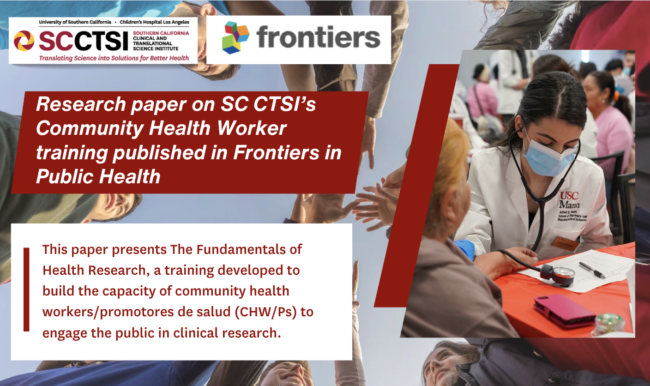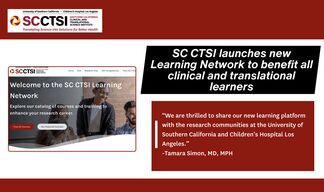Research paper on SC CTSI’s Community Health Worker training published in "Frontiers in Public Health"
A new paper published in "Frontiers in Public Health" highlights SC CTSI’s Fundamentals of Health Research training, a model designed to strengthen research understanding and engagement among community health workers.
SC CTSI’s Community Engagement Core recently published a research paper in Frontiers in Public Health titled “The Fundamentals of Health Research Training for Community Health Workers: A Mixed-Methods Study.” The paper was authored by Nicole Wolfe, PhD; Andrea Diaz; Brian Do-Golden, MPH, CHES; Esther Karpilow; Mayra Rubio-Diaz; and Michele D. Kipke, PhD. This paper presents The Fundamentals of Health Research, a training developed to build the capacity of community health workers/promotores de salud (CHW/Ps) to engage the public in clinical research. The training equips them with the knowledge and skills needed to serve as trusted research educators, advocates, and members of research teams.

The 12-hour Fundamentals of Health Research training offers a scalable model for strengthening research participation across populations. This five-part curriculum was co-developed and delivered by experienced CHW/Ps from the Community Engagement Core and included interactive components such as role-playing, IRB simulations, and the development of mock community-based research projects.
Between March and September 2023, 128 CHWs completed the training, with 103 (80.5%) completing the 12-month follow-up. Most participants identified as Latina (93%) and female (96%). Findings revealed a 46.8% increase in research knowledge, a 49.1% increase in likelihood of participating in research, and an average self-efficacy rating of 8 out of 10 for communicating about research. Over half (53.9%) reported referring individuals to research studies post-training. Qualitative findings further emphasized increased understanding of research ethics, persistent mistrust in research settings, and the potential for long-term impact.
By documenting the development, implementation, and evaluation of this training, the paper contributes to the field by identifying best practices for engaging CHW/Ps and assessing the program’s effectiveness through a mixed-methods approach. Read the paper here.



